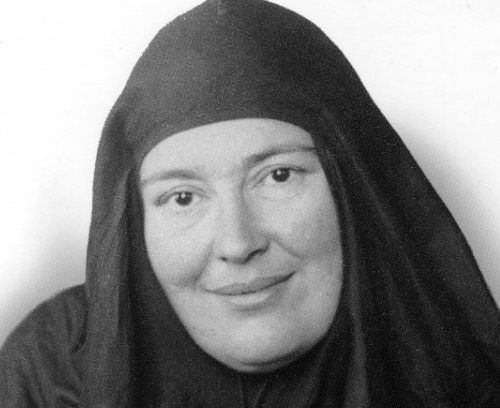
Elizaveta Pilenko was an Eastern Orthodox nun who saved French Jews by hiding them in her convent and smuggling them to safe houses. This holy woman, known as Mother Maria, paid the ultimate price for her bravery.
Born in Latvia in 1891, Elizaveta’s parents were pious Orthodox Christians who raised her in an environment drenched in faith. At seven, she asked her mother if she could become a nun. However, young Elizaveta’s world fell apart when her beloved father died when she was 14. The girl’s grief was so overwhelming that it destroyed her faith. The lesson she learned from her father’s untimely death was that adults know God doesn’t exist, but they lie to kids about it. She felt that God was no more real than Santa Claus. Teenage Elizaveta said, “If there is no justice, then there is no God.”
After her father’s funeral, Elizaveta’s mother moved the family to St. Petersburg. It was 1906, and the Russian revoutionary movement was gaining steam. Now a sworn atheist, Elizaveta felt a kinship with the antiestablishment communists, and she joined up with a radical group in St. Petersburg. However, despite her young age – only 15 – Elizaveta grew frustrated with the immaturity of her Bolshevik comrades, who loved to spend hours in bohemian cafes talking about revolution, but were less concerned with actually getting anything done. She said, “…they will not understand that to die for the revolution means to feel a rope around one’s neck.”
Not finding comfort in the faith she was raised with or the communist ideology of her friends in St. Petersburg, Elizaveta got married at 18 to Dimitri Kuzmin-Karaviev, an alcoholic. The couple had a daughter, Gaiana, and Elizaveta began writing poetry and studying theology, awakening her long-dormant interest in religion. The marriage was not a happy one, and Elizaveta and Dimitri divorced after three years. She applied and was accepted at the prestigious theological seminary at the Alexander Nevsky Monastery in St. Petersburg, becoming one of the first females to attend.
During the Russian Revolution, in 1918, Elizaveta was elected deputy mayor of the town of Anapa. The White Army – loyal to the Tsar – captured the town, leading the mayor to flee and Elizaveta to become mayor. She was arrested by the White Army for being a Bolshevik, even though she had long before renounced her communist beliefs. Elizaveta was put on trial but the judge, Daniel Skobstova, fell in love with her and saved her life. After the trial was adjourned Elizaveta and Daniel were married. They had a son, Yuri, and another daughter, Anastasia. The family traveled around Europe, moving to Yugoslavia and then Paris. In 1926, Elizaveta suffered another tragedy – her baby girl Anastasia died of influenza. Once again Elizaveta’s life was turned upside down by grief. Her marriage fell apart, and Yuri went to live with his father. Several years later, the unthinkable happened: Elizaveta’s oldest daughter Gaiana suddenly died. Alone now and ravaged by depression and loss, Elizaveta decided to change her life dramatically. Instead of stewing in her own misery, she would focus on helping others.
Elizaveta felt a strong calling to help the needy. She divorced her second husband and fulfilled her childhood dream: she became a nun, taking the name Mother Maria. She rented an old house in Paris and called it her “convent.” She kept the door unlocked and welcomed refugees and the poor. Father Dmitri Klepinin became house chaplain.
So many people came to Mother Maria’s convent seeking help that they filled every inch of the building. Elizaveta/Mother Maria slept in the basement next to the boiler. Some of the people seeking refuge in the “convent” were children, and Mother Maria set up the dining area as a classroom. This continued for two years, until Elizaveta was able to buy a bigger house, a “handyman’s special” that could sleep 100. Stables in back were transformed into a church.
On May 10, 1940 the Germans marched into France, and the country fell to Germany a month later. Suddenly, French Jews started flocking to Elizaveta’s convent, begging for refuge and help. Father Dmitri started making fake baptismal certificates so Jews could hide their identities, and Elizaveta fed and hid as many Jews in the house as she could. The collaborationist Vichy regime kept thousands of Jews in stadiums before being deported to concentration camps. Elizaveta snuck into these massive holding facilities bringing food and water for the Jews imprisoned there. Once she smuggled four Jewish children out in garbage bins and then found safe homes for them.
Elizaveta/Mother Maria, her son Yuri and Father Dmitri continued hiding and helping Jewish refugees for almost three years. In early 1943 their luck ran out. Father Dmitri and Yuri were arrested by the Gestapo and sent to a concentration camp in Germany, where Yuri was executed and the priest died of pneumonia. Soon after their arrest, Elizaveta too was arrested and sent to Ravensbruck, a camp for women only. There, in 1945, Elizaveta volunteered to die in place of a young Jewish woman. She was sent to the gas chamber in March, 1945. Soon after, the camp was liberated.
Elizaveta Pilenko, aka Mother Maria, was canonized as an Eastern Orthodox saint in 2004, along with her son Yuri and Father Dmitri. She was recognized as Righteous Among the Nations by Israeli Holocaust Memorial Yad Vashem.
For welcoming Jewish refugees and saving lives, at the cost of her own, we honor Elizaveta Pilenko, Mother Maria, as this week’s Thursday Hero.
Get the best of Accidental Talmudist in your inbox: sign up for our weekly newsletter.